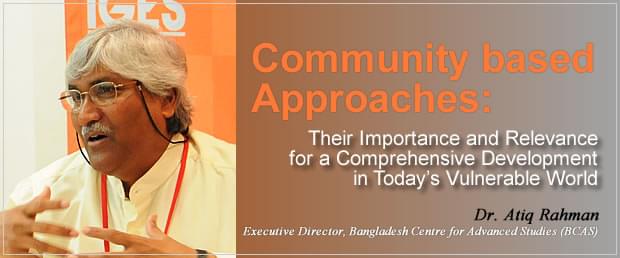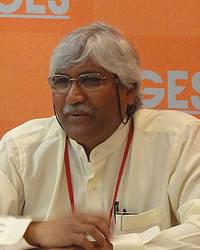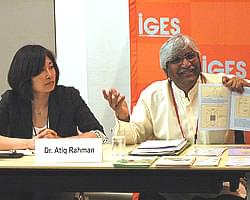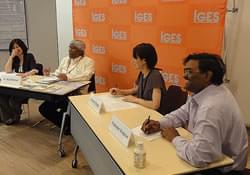|  |
Dr. Atiq Rahman is the Executive Director of Bangladesh Centre for Advanced Studies (BCAS) and has been involved in community-based approaches in various fields and at different levels. Through the interview, Dr. Rahman explained the background to the success of community-based approaches by BCAS, their importance and relevance for development in other countries including developed ones. |
 | Vinya S. Rahman
General Secretary, Sarvodaya Shramadana Movement |
|
---At the outset, can you please introduce our audience to the institute you are currently leading and the basic values and approaches you are trying to promote through your work?
Dr. Rahman:
I am the technical head of Bangladesh Centre for Advanced Studies (BCAS). BCAS works at different levels, with the communities, local level planning, international agencies and global systems. I sit on various government committees while working with an independent institute like BCAS so what I say here comes from both the perspectives. I was teaching at Oxford University 25 years ago but I moved to Bangladesh to work with BCAS since I believed that there is much to do in my own country to improve the policy processes by linking them to science. We developed a model where the policy, science and people are linked. In most industrialised countries, science and policy talk to each other as most environmental problems have scientific basis. The same is required in climate change too. However, some policy-makers are influenced by the oil lobbyists and other industry agents and are taking policy in the wrong direction. Over years of dedicated work, we have challenged the science-policy model and changed it into a science-policy-people model. Environment and development are very much linked. Soon we realised that we have various sectors involved in it, such as infrastructure, food, rural areas etc. So now we are talking about developmental implications of climate change. Environment and development, poverty alleviation, good governance and economic growth are the elements that make our concept of sustainable development with other crosscutting elements interact.
---Now, it is clear from your discussion that your institute in particular and Bangladesh in general has been promoting community-based development to an extent that people look at Bangladesh as a land of community-based approaches. Can you educate us on what made this possible and what lessons other countries can learn from this great success story?
 |
Dr. Rahman:
I am both a geo-engineering scientist and a policy expert in community-based adaptation. Bangladesh has a tradition of local level management partly due to the culture and partly due to the failure of the government. ‘Democracy is democracy of the elected’ and ‘richness is the richness of elected’. So the question is how to reach the people. Bangladesh is one of the most highly disaster-prone countries in the world. We thought that the best way is communities leading their own life and not to wait for scientists to tell them to adapt. Using community approaches and understanding of the local issues and indigenous knowledge, we are able to solve problems that are long-term in nature.
The development community tries to carry out development but with limited results, since the baseline is shifting based on which decisions are to be made by these communities. Once these development communities talk with climate change communities, they understand the issue clearly and are able to achieve good success as in the case of Action Research for Community Based Adaptation (ARCAB). International NGOs came together and have decided to work with BCAS where this ARCAB was designed. We have developed a methodology called participatory monitoring and evaluation where people are involved using the indicators identified by participatory approaches. The Stockholm Environment Institute (SEI), Oxford University, Harvard University etc are helping us with the science part of the process. We hold a world conference on community-based adaptation every year that is gaining attention from the world community.
---One of the understandings from your discussion is that community-based approaches are good in developing countries where governance problems are the reason behind many problems. Do you think these approaches are applicable in developed countries and if so how they can fit into the context?
Dr. Rahman:
Communities are communities wherever they are, whether in developed or developing countries; I have worked with communities in both countries. Japan has changed now; my last three days of experience tell me that the recent earthquake has shaken the psyche of Japan and you have realised that the infrastructure cannot solve the problem but you need some community involvement. Now, you are talking about dignity of the people, inclusion of the people (can we include everybody from all ages and socio-economic groups etc.).
We have been working with communities in Bangladesh for years where communities have said that they need some ‘fall-back mechanism’ similar to animals etc. which they can use after they return from a cyclone shelter after the cyclone. These approaches would have to be ‘molded’ to Japanese conditions. One should also know the limits of what one can do and what one cannot do. For example, one cannot remove the nuclear radiation for several years down the line but appropriate support such as shelter, water, food, employment should be provided. One should also remember that a 1000-year event need not necessarily repeat only after 1000 years: it may come even in the next year even though the probability may be low. So, policy-makers need to keep this probability aspect while planning for disasters.
Questions from the audience:
--- Nanda Kumar, IGES: Can you tell us how effective it would be to take the climate change debate to the UN Security Council for its intervention?
Dr. Rahman:
The Security Council may not be able to make much difference to the climate change problem. The problem is not with the Security Council but with the failure of the UNFCCC system. My long association with the UNFCCC indicated that it has its own limitations. When the Kyoto Protocol was agreed with targets, people said that it is the best protocol one could achieve.
It indicated that we could work out a lowest common denominator and our governments couldn’t even achieve it. A majority of the population in some developing countries is still undernourished and they are not able to feed themselves but still they are talking about mitigation. So, it is a failure of the governments. The Security Council may be able to stop a war or bring additional money but climate change has enough money built into the system so it may not make much difference.
 |
--- Nanda Kumar, IGES: You said most of the professionals in climate change are from the environmental field and though over the years there has been infusion of social and policy professionals into the process, do you think governments are still approaching the problem in a single discipline or multi-discipline?
Dr. Rahman:
Reality is that it is neither single nor multi-disciplinary but it is the dollar that is dictating the decisions being made. No decisions are made in the UNFCCC negotiations, all decisions are made back in the country, in the ministry of environment.
However, no MOE personnel are trained on negotiations, negotiations are about legal issues, foreign affairs, and it is about protecting the best interest of the country and environment is about protecting the common interest. Other problem is every policy-maker has five year tenure while climate change is a long-term problem which needs new ways of governance. If we want to go fast, a single disciplinary approach is the way; however, if we want to go far, a multi-disciplinary approach is the way.
---Citizen from Japan: I liked your comment about the ARCAB. I know that there are similar projects going on everywhere but the problem I see is that they are isolated and not connected to other processes.
We call this a garland theory where no bead is connected to another bead. NGOs have a limited time line where they have to spend the money, so end up pushing the money and spending it on bad projects. I think one needs to give responsibility and respect to the recipient of the fund, make it participatory, and give time to them to implement it while making them accountable. Evaluation has to be continuous but not at the end. So, most of the time, these projects can be termed as ‘the world of mutual cheating.’ Research has become so predictive that even communities know how to respond to any survey, they will start answering questions even before they are asked.
---How do we link the Rio+20 with the community based development model?
Dr. Rahman:
I was very much involved with the Rio process in 1992 as a part of the Global Forum on Environment and Poverty. A group which was few in number has grown to 10,000. It is for the countries to solve the issues they created such as climate change, loss of biodiversity and desertification, and then talk with the poor. We had Rio+10 where MDG was an outcome. Rio+20 is about green economy and institutional structure.
Green economy will be possible only if there is enough happening in terms of alternative energy, food systems etc. One of the tragedies is that the global job market has changed, and the smarter people from developing countries are going for global market. We need to bring them back to the land that needs them. We need to bring back the idealism. We have to have a vision for the planet, so that the population growth is controlled, so that we have less people and less carbon. We need young people to fight for these causes so that we are able to feed everybody on the planet. This is just about basic needs such as food and water. There is more food on the planet than we need, more medicines than we need, and more water than we need; why is it that one third of the world is starving? Something isn’t right!
--- Thank you very much for your precious thoughts. As a research institute, we should learn from these experiences, assess the past, and be able to draw vision for the future.
Dr. Rahman’s talk based on his extensive knowledge and experiences in community-based approaches emphasised the importance of involvement of the people who know their own needs. It was also made clear that the link between science, policy and people, and between different issues such as climate change, poverty, development, and so on needs to be established or recognised. It provided important implications to various issues today such as climate change policy and Japan’s recovery after the earthquake.
Facilitator: Y.Kataoka (IGES)
Interviewers: SVRK Prabhakar, Nozomi Okubo (IGES)
|
About "ISAP2011 Interactive Sessions"
ISAP Interactive Sessions inviting selected guests were convened back-to-back with the third International Forum for Sustainable Asia and the Pacific (ISAP2011). A series of meetings intends to facilitate close dialogues between guest speakers and IGES researchers. It also intended to facilitate discussions between the guests and audiences in a participatory manner. Each meeting was designed to have: (i) an interview session conducted by IGES young researchers to get in-depth understanding on the views and opinions of the guest speakers; and (ii) a Q&A session with the audiences. |
|
| | |
|

